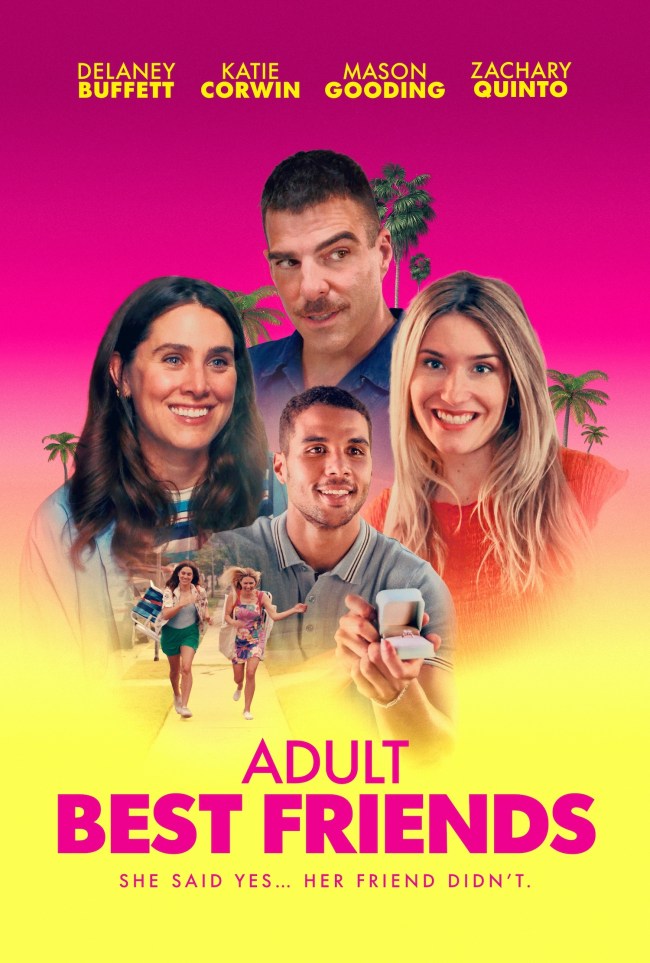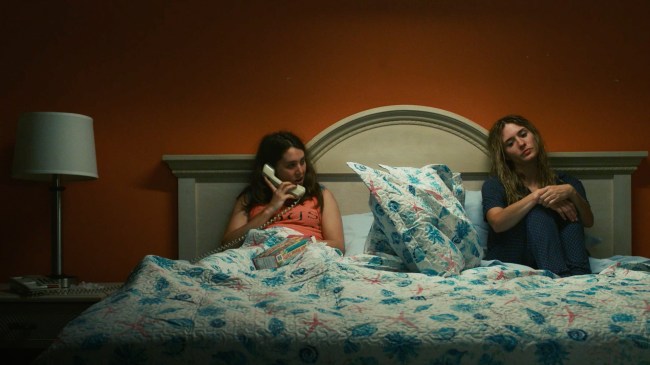via Adult Best Friends
I watched a movie called Adult Best Friends on a Friday night after coming home from a party in Hollywood where Green Day, a quintessential band of my middle school years, was promoting their new 7-Eleven Slurpee. If you’re interested in the frivolous details, it’s called Kerplunk Candy Grape (after their 1992 album) and it tastes like those big juicy Trader Joe’s cotton candy grapes you buy when you feel like splurging on an all-natural sweet treat.
As far as these things go, it was a pretty good party: The band entered the room with a megaphone, and there was a giant 7-Eleven Slurpee machine, along with an open bar and passed trays of lobster rolls and hot dogs as passed hors d’oeuvres. I snapped a pic with Tré Cool after we chatted about how stoked he was about their new star on the Hollywood Walk of Fame.
Look, I realize this sounds like a parody of Los Angeles life, until you consider that I was even more excited to be home by 9 PM, shoes off, and kerplunking into my couch after a long week of partnership decks and content strategy emails.
I opened MAX, and right there on the home screen was the key art for Adult Best Friends, a low-budget indie comedy.
I hit play.
I’m so glad I did. I loved it.
Adult Best Friends is co-written, directed, and stars Delaney Buffett, Jimmy Buffett’s 33-year-old daughter. Her debut feature had just dropped on MAX.
I’d been tracking it since I saw it making the rounds on the festival circuit. I also got a bunch of press emails for it, but somehow missed if there were any screenings in Los Angeles to yap about it at my day job over at BroBible.
I didn’t know what to expect. Maybe something light, escapist, breezy. Something, you know… Buffett-y?
What I got instead was a smart millennial coming-of-age film that left me with a big ole smile.
Adult Best Friends is funny, sharp, emotionally layered, and seems way more self-aware than it lets on.
The film follows Katie (Katie Corwin), who’s just gotten engaged but hasn’t told her best friend Delaney (played by Buffett). Delaney is stuck at a crossroads in her life. She’s unmotivated, emotionally stalled, and still deep in the early-30s party circuit. Despite all that, her opinion still matters to Katie. The phrase “arrested development” gets tossed around a few times to describe them both, almost in a clinical way. To soften the news and try to reconnect, Katie plans a girls’ trip to the beach town they used to love. What starts as lighthearted hijinks slowly unravels into something more serious, as long-buried tension rises to the surface.
Yes, it’s a movie about millennial friendship. But it’s also about that weird, weighty shift in your thirties when the world stops waiting for you to figure it out, and starts expecting that you already have.
And if you haven’t, like Delany’s character in the movie?
Well… that’s where it gets interesting.
The Millennial Coming-of-Age Doesn’t Doesn’t Just Happen in Your Twenties
This is a coming-of-age story about that strange, unspoken stretch of adulthood when your friends are getting married, moving to the suburbs, finding religion, or going full tech libertarian, and you’re still quietly asking yourself the same question you don’t have a definitive answer for:
What do I actually want?
That’s a different kind of coming-of-age. It’s not about finding yourself in college or flailing through your first job. It creeps in with birthday anxiety and half-drunken heart-to-hearts with whomever will listen. It shows up when there are fewer ways to admit you still feel lost.
Your twenties are for trying and failing. In your thirties, the failures start to stick. They become stories. Eventually, they become patterns.
And it’s fine not to have the answer. Most of us don’t (…though I’d argue a loose set of goals to strive for usually helps). Figuring out what you want usually looks more like a string of small moments than some grand revelation. It’s about staying open.
There’s a quote from Hunter S. Thompson I always have rattling around in my head when thinking about the difference between your 20s vs. your 30s. When younger journalists interviewed him, Thompson would ask how old they were. They’d say “28” or “36” or whatever. Then he’d tell them that in your twenties, you can afford to mess up. But in your thirties, your mistakes start to matter. They cost more. Not just in money, but in time, in closeness, in who you become.
I helped work on a collection of his interviews with his widow Anita back in my early twenties. When I read that line at that age, I shrugged it off. Now that I’m staring down 40, I get it.
That’s what this movie gets right. The two best friends at the center—Delaney (played by Delaney Buffett) and Katie (played by co-writer Katie Corwin)—are both in limbo in such a uniquely millennial way, where ambition and disillusionment get messy. When your optimism starts to flicker but never quite dies.

They’re holding on to each other because shared history feels safer than starting over. But facing what’s next also means admitting that the last chapter, at least for one person, didn’t go how you thought it would.
And that’s just how life goes. Strikes and gutters, as The Dude would say.
Sarcasm Is Not a Personality
While the plot is pretty conventional, one of the smartest things Adult Best Friends does is capture a very specific kind of millennial irony-poisoning. I’m certainly guilty of this, probably from way too much time in front of a computer screen.
There’s still plenty of “smart snark” on the internet, but in a lot of ways, it’s gone out of fashion from the days Gawker and Deadspin dominated the idea of the online voice. That thing where you’re constantly filtering every emotion through sarcasm, where sincerity feels embarrassing, and vulnerability gets buried under a dozen disclaimers.
The film doesn’t spell it out, but you feel it in the way Delaney and Katie’s friendship begins to fray. The big rupture is Katie’s engagement. She hides the news from Delaney, knowing her best friend has strong, maybe cynical, feelings about marriage. But the real issue runs deeper. Over time, they’ve built up so many tiny defense mechanisms that they’ve forgotten how to be honest with each other.
The tension in their friendship causes everything to turn into a dodge, a bit, until things finally boil over. And when the truth finally surfaces, neither of them knows how to just say how they feel.
Add in the mix Cazzie David, whose character plays the toxic, naysaying pessimist friend. A “hate-everything” Daria type, but cranked up a notch.
Rather than confronting the tension in a friendship and the underlying elephant in the room, everything becomes a dodge. The deception becomes palpable.
It reminded me of how the internet trained us with groupthink, especially those of us who grew up online, to define ourselves by what we hate. What gives us the “ick.” What trends find their fans and others love, yet we refuse to participate in because of some pretense of “cringe”. It’s a culture of curation by elimination. It’s judgey and pretentious. You build your personality around the things you don’t like, rather than the things you love.
Man, that shit sucks.
That attitude creeps into relationships, too, like a slow, invisible infection. Especially friendships. You start pruning people like a feed. You start muting, dodging, unfollowing, and ghosting anyone who doesn’t fit your ever-shrinking definition of acceptable, instead of hearing them out or looking inward.
It’s easy to fall into the trap of treating emotional discomfort like an algorithmic flaw. Like if someone says the wrong thing, they’re incompatible. Glitchy. Not worth the update.
But that’s not how human connection works. Not real friendship. Not in your thirties. And that’s what Adult Best Friends gently wrestles with. It’s about staying open, even when it’s messy.
Especially when it’s messy.
Writing and Playing A Character Named After Yourself Is Pretty Badass!
I haven’t done a deep dive into the discourse around this movie, aside from what’s popped up on my Instagram feed during the promo push.
But one thing stood out to me: there’s something fascinating, and kind of low-key punk, about naming the main character Delaney and playing her yourself. It doesn’t feel like a cutesy autofiction gimmick either. It feels like a bold artistic decision that walks the line between satire and sincerity.
The Delaney on screen is still partying through her early 30s in a way that’s not that atypical for all of us yuppie DINK-types in cities like LA, New York, or Chicago, or anyone else who likes to cut loose. But she’s also petty. Emotionally avoidant. That creates a growing distance between her and Katie, who’s ready to leave the city and settle into married life. Delaney keeps up the performance like she’s got it all figured out, but starts to unravel when Katie hits her with a few blunt truths on the drive back from the beach. These are truths she has to wrestle with, whether she wants to or not.
It’s a brave move to write a version of yourself that isn’t wildly aspirational or heroic. Just flawed and real.
It reminded me of the Girls era, when Lena Dunham dropped that show and people lost their minds over how “unlikable” Hannah was. And how that discourse unfairly blurred into how people saw Dunham herself. Thankfully, certain blocs of the culture have matured a bit since then. With a good redemption arc, no one thinks twice about complicated characters needing to be role models. Delaney leans into that onscreen with a coolness. She doesn’t announce how honest the film is. She just lets it be honest.
And it works. The arc between her and Katie is a soft letting go, more than a dramatic reconciliation. A friendship that meant everything and always will, but will now write new chapters that aren’t a complete co-dependence.
There’s grief in that. But also growth.
A Magic Kind of Nod to Dad
Let me be clear: this isn’t a Jimmy Buffett movie. No tropical shirts. No volcano bars. No cheeseburgers in paradise.
But his spirit is still there, threaded into the background with grace.
There’s a scene where the girls return to an unnamed beach town and step into a swampy dive bar—Delaney’s idea, not Katie’s. One Buffett song hums from a jukebox. Later, they toast with Landshark beers as another track kicks in with the volume up, perfectly timed with Fireball shots and flirtations. That moment gave me chills because it’s one of my favorite Jimmy Buffett songs.
I don’t want to ruin the show for you by revealing which ones. Go see that for yourself.
If you didn’t know Buffett’s music or realize his daughter made this film, you might miss it entirely. That’s how naturally it fits. It’s not fan service or branding. It’s just warmth. A daughter weaving her dad’s world into her own story, without letting it take over.
I couldn’t stop smiling during those scenes. It hit me hard in the feels, and I can’t imagine the emotion that went into perfecting it during post-production. I miss that dude and the beautiful, escapist Tao he brought into the world.
There’s been a lot of talk about Hollywood nepotism over the past few years, and much of it flattens what actually makes great storytelling compelling. Cazzie David is great in Adult Best Friends. Patrick Schwarzenegger was perfect in that libido-drunk finance bro role in White Lotus Season 3. Sometimes these so-called nepo babies bring the exact weird energy a story needs.

It’s cool to see someone nod to where they come from and still carve out something that feels entirely their own. For anyone who grew up with Jimmy Buffett’s music as the soundtrack to summer cookouts, boat days, and beach vacations, these little moments alone make Adult Best Friends worth watching.
A Pirate Looks at Us, The Millennials
We consume art to hold a mirror up to our lives. To find language for whatever quiet thing we’ve been feeling.
There’s something poetic about the timing of all this. I turn 40 this year, and lately I’ve been thinking a lot about “A Pirate Looks at Forty,” one of Jimmy Buffett’s most introspective songs. It was released in 1974 on A1A. He wrote it in his late 20s, after fleeing Nashville for Key West. The song isn’t really about him, though. It’s about a colorful former Key West smuggler named Phil Clark. Buffett met him in the ‘70s and captured his story the way great writers do: not by making it about himself, but by stepping into someone else’s shoes.
That’s the trap some Buffett fans fall into. They think all his music is autobiography. But a lot of it is just good storytelling. Fiction wrapped in steel drums and Michael Utley’s keyboard.
“A Pirate Looks at Forty” is about reckoning. Inventory. Trying to make peace with the things you chased and the things you lost.
I think a lot of millennials are just now getting there. Awkwardly, but inevitably. I certainly am. We’re not the kids anymore. We’re the adults in the room, though we’re still treated like kids more often than we’d like. And we’re trying to figure out what that even means.
What excites me is that I think we’re on the verge of a new wave of millennial art, and Adult Best Friends getting distributed by Gravitas Ventures and ending up on a major streamer shows that.
Millennial coming-of-age art isn’t going to be waves of nostalgia or irony or refusing to grow up, but about confronting the next big, really scary chapters of adulthood head-on. Gen X had their This Is 40 comedy era, with its grunge hangovers and “remember the ’90s?” ennui. Ours might sound different.
Maybe our midlife crisis shows up in lowercase tweets and subreddit spirals. In art that simmers with frustration. Because let’s face it, our generation got rolled. We came online during the rise of surveillance capitalism. We graduated into a financial collapse, amassing debt for college degrees we were told were integral to our future. We were shipped off to Iraq and Afghanistan in a war that dragged on for 15 years and now barely gets mentioned. And now we’re watching the world fall apart while trying to figure out how to pay for dental, let alone chase the version of the American Dream that other generations were sold with a straight face.
We were shaped by wars we didn’t start and recessions we didn’t cause. Our brains were rewired by the very tools that promised to connect us. And the stories we tell about middle age about friendship, failure, identity are going to reflect all of that.
Adult Best Friends fits into that wave. And if it’s any indication of what’s coming, I think we’re in for a thought-provoking era of millennial filmmaking.
Like a lot of us, I like to scroll through the discourse online before I commit to actively watching a project. I’m pretty glad I didn’t for this one. Naturally, Adult Best Friends has ts haters, like the guy who claimed “the only good thing about this movie is that it finally ended” and then rage-spiraled into a monologue about cat videos, millennial narcissism, and cocaine use “on a Tuesday night at home alone with your cat.” He was especially outraged by the idea of two thirtysomethings with “great apartments” daring to feel emotions. Somewhere between accusing them of being “a waste of oxygen” and blaming their issues on a missed Sweet Sixteen, he basically wrote a better character study than the movie itself.
You gotta ignore cranks like that.
Like, I thought it made for a great Friday night watch after coming home from a party.
For 90 minutes, I didn’t check my phone. I sat on my couch and ate one of those grocery store cups of pomegranate seeds I had sitting in the fridge.
That might not sound like much, but in 2025, frying my brain with too much 9:16 content slop, that’s the highest compliment I can give. If you’re still stuck in a Peter Pan phase, wondering if you’ll ever snap out of it, it’s worth a watch.
Like, not grow up in the “buy a house and have a kid” way. Grow up in the “you got this” way with a vision and some goals for who you want to be.
It just starts with admitting you don’t have it all figured out.
And deciding to change anyway.
Content shared from brobible.com.

